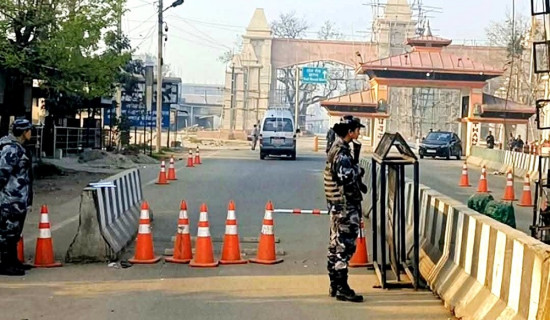- Tuesday, 3 March 2026
Promoting Good Practices In Cooperatives
Sahakary” or “Cooperative” is a term riddled with corruption in Nepal today! However, simply defined, it is an act of helping. The cooperative movement worldwide is fostered with a philosophy of a self-governing association of people who come together voluntarily to meet certain common goals set for their community. These goals can be social, economic, cultural, or financial. People come together to set up a collectively owned and democratically controlled enterprise. According to the International Cooperative Alliance, cooperatives contribute to long-term economic growth and offer high-quality employment for 280 million people worldwide, which is 10 per cent of the world’s workforce.
However, looking at the condition of certain cooperatives in Nepal today, instead of being organisations with noble missions and goals aimed at improving the social and economic conditions of their members and the communities where they exist, there are cases of severe embezzlements of funds and misappropriation leading to the board members fleeing with member savings.
Cooperatives come in several types, including agriculture, dairy, and savings and credit cooperatives (SACCOS). The governance of SACCOs is in dire straits at the moment, with senior politicians and even ministers accused of being part of scams that have blacklisted certain cooperatives. The Small Farmers Development Project (SFDP), which led to the formation of the small farmers development cooperatives (SFDC), serves as an example of agricultural cooperatives and SACCOs that have become models of good cooperative practices globally.
Misappropriations
Agricultural cooperatives are major players in European farming, accounting for 40 per cent to 60 per cent of agricultural trade and are key actors in improving the lives of people in rural settings. Similarly, in Sweden, approximately 50 per cent of all multifamily buildings are owned and managed as cooperatives known as housing cooperatives. Unfortunately, in Nepal, one of the pioneers in the multi-housing industry, Ichcha Man Tamang, an engineer turned politician who set up a series of Civil Housings, Civil SACCOs, and Civil Development Bank, is now in prison serving terms for a series of fund misappropriations, mismanagement, and bad governance.
By nature, cooperatives can be sustainable and participatory settings for the group of people who establish them. According to Zapata, during the COVID-19 pandemic, housing cooperatives demonstrated their ability to promote the well-being of vulnerable individuals and the community, helping to tide over the economic and financial crisis that arose then. According to the United Nations, agricultural cooperatives have enabled small producers to share risks, gain market access, and make investments in their activities. Billiet et al. cite that solidarity and social networking are the driving forces behind the initiatives promoted by consumer cooperatives in Italy, which donated their profits to local community cooperatives after experiencing an increase in revenue during the pandemic months.
The basic principle of the cooperative movement, no matter the type of cooperative, is that all women and men who are shareholders/members have the same voice in the decision-making process, either directly or through the committees formed in the cooperatives they belong to. Unfortunately, most cooperatives facing crises in Nepal have overlooked this main principle. Often, a group of people forms cooperatives and collects savings without making the savers members. Even those who were made members were never involved in the decision-making process. All the grocery shops today have people collecting savings every week. The shopkeepers, when asked, say it is the cooperatives or the “finance” collecting these funds, but they are not clear on what these institutions actually mean and what act of the Nepal government they are registered under.
The cooperative movement should be free, fair, and transparent without any intimidation of any member. One of the main reasons for the cooperative movement crisis in Nepal today is the lack of these three aspects. Often, people in positions of power, like the chairperson and the board members, either keep the business of the cooperatives to themselves or are not aware of what the cooperatives they are part of are doing! The office-bearers should be open to differing views of all general members and aim toward holistic development in a transparent manner.
Transparency
In the case of SACCOS, the governance and management committees must have processes and procedures in place that produce timely results using resources in the most economical way. If the indicators of good governance are to be met, the results must meet the needs of the members and stakeholders. All members have equal rights to access the opportunities, services, and benefits of the SACCOS. Unfortunately, there have been cases of suppression and lack of transparency, leading to major crises. The leaders and managers have taken authoritative decisions and kept the general members in ignorance. This is a major operational flaw that now needs to be properly addressed.
The first cooperative was established in 1956 in Nepal. Since then, the movement has gone through several phases. It is unfortunate that a country where some of the best practices in different categories of cooperatives have been set, garnering global accolades, is now in a crisis where even the Home Minister, among others, is accused of misappropriation of funds. But there are excellent examples of SACCOs, especially in the rural areas, hills, and mountains of the country, where they are the sole source of financial transactions mainly for the excluded communities. These SACCOs have been able to improve the socio-economic conditions of the members, which is the main purpose of their existence. Although efforts have already commenced, they need to be expedited, and the savings of the members returned as soon as possible, with a focus on establishing good governance in all cooperatives in Nepal.
(Sharma is a senior journalist and women's rights advocate. namrata1964@yahoo.com. Twitter handle: @NamrataSharmaP)
















